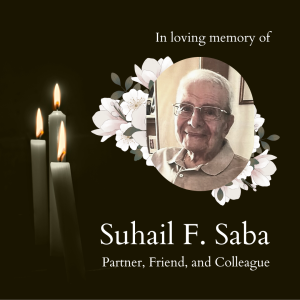SABA IP WAS FOUNDED IN 1926 AT A TIME WHEN THE FIELD OF INTELLECTUAL PROPERTY LAW, IN THE MIDDLE EAST, WAS STILL IN ITS INFANCY.
WE OPERATE ACROSS THE MIDDLE EAST AND AFRICA
We provide a wide range of legal and paralegal services in the Middle East, Africa, and their neighboring regions through an extensive network of branch and representative offices. Our Head Office in Lebanon provides IP services in countries in the rest of the world through our widely established network of associate firms.
FAQS
When the trademark in question can be transliterated in different phonetic renditions, a vast scope of inconsistencies may come as a result of this. Careful thought and consideration must therefore be taken from the outset to select the most accurate and appropriate transliteration and to ensure that this version is consistently used.
When it comes to the treatment of trademarks in a multi-lingual context, trademark laws of Arab countries are traditionally designed to avoid conflicts between marks across different languages, and to provide specifically for the protection of the transliteration of marks. Accordingly, the registration of a trademark in its Latin (original) script in any Arab country should, in general, provide protection against the registration of another confusingly similar transliteration liable to create public confusion. However, while the transliteration of the mark is protected, likelihood of confusion is easier to prove when comparing marks in the same language. Having said that, registering trademarks in transliterated Arabic script, in addition to their original format, is advisable considering that most Arab countries are in principal governed by civil law – that is, the concept of first to file carries considerable weight. While some countries may offer a limited number of common law rights, registration is highly recommended and can be used as a basis on which to sue an infringer.
There is some element of harmonization with common standards available across the different Arab countries, though each country has the primary responsibility for the regulation of the trademark matters within its jurisdiction and consequently each has its own trademark laws with slight differences in the procedural aspects. The standard definition of a trademark is common and the absolute grounds of registration are relatively the same with some minor differences. In Saudi Arabia, for example, the trademark law is to be used in conjunction with the Shari’a law (the body of Islamic religious law).
With the exception of Morocco and Lebanon, ex-officio examination on relative grounds is performed in all countries. Also, nearly all countries except Lebanon and Algeria provide opposition proceedings prior to registration. Apart from Tunisia, decisions of TMOs in opposition proceedings are binding. The length of protection of a trademark and the method of renewing a trademark is almost the same – 10 years in nearly all countries (with the exception of Lebanon, West Bank, Gaza and Saudi Arabia).
Marking is not compulsory in the Middle East and North Africa. However, using any of those symbols on a trademark is advisable because it will give notice to the public about the owners’ rights.
In principal, the ™ symbol may be used when trademark rights are claimed in relation to a mark that has not been registered at the Trademark Office of a particular jurisdiction, meaning that, the use of the ™ symbol does not mean a legally enforceable trademark. The registration symbol ®, however, does carry legal weight. It should only be used when the mark is registered with the Trademark Office of a particular jurisdiction. Using the symbol ® illegitimately may be treated as fraudulent marking in most of the countries in our region.

